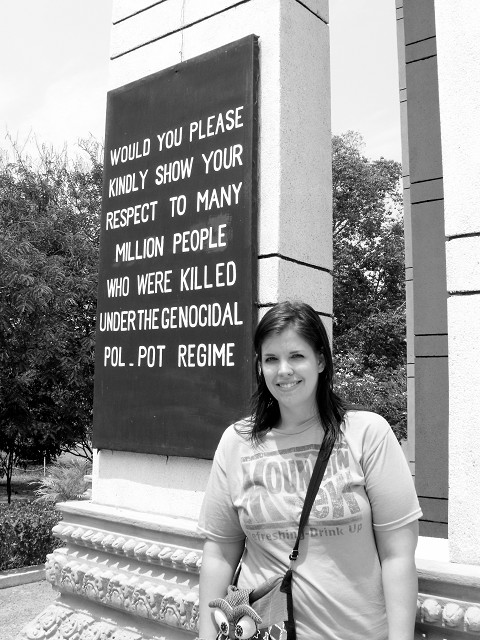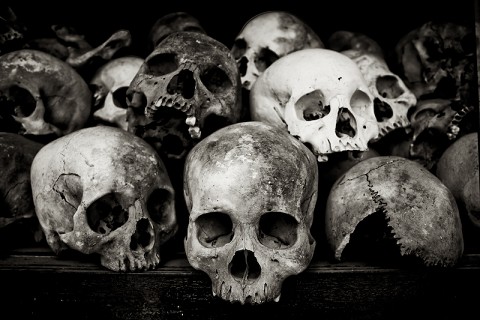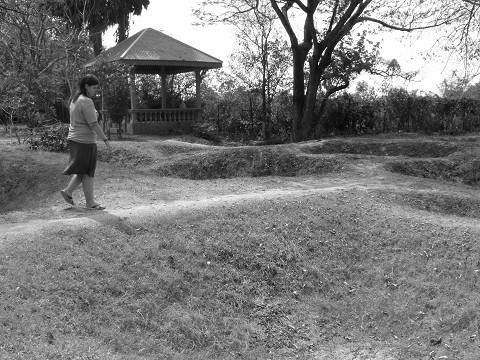 I’m reading a book about International Justice Mission’s work in Southeast Asia, and more specifically Cambodia. One of the chapters really hit home with what I’ve been thinking about this month. I’ve come face to face with the horrific reality that happened in Cambodia in the late 70’s and can see the impact it still has on society here today. Over 3 million educated, hard working, innocent lives were taken in the most brutal ways I’ve ever heard. I was able to visit one of the famous “killing fields” which is now a monument set up to honor the lives lost. As I saw the pictures, read the stories, walked through the mass graves, I couldn’t help but think what my life would have been like if I was alive back then. Then as I started reading the book “Terrify No More” I saw that the author, Gary Haugen, was asking some of the same questions…
I’m reading a book about International Justice Mission’s work in Southeast Asia, and more specifically Cambodia. One of the chapters really hit home with what I’ve been thinking about this month. I’ve come face to face with the horrific reality that happened in Cambodia in the late 70’s and can see the impact it still has on society here today. Over 3 million educated, hard working, innocent lives were taken in the most brutal ways I’ve ever heard. I was able to visit one of the famous “killing fields” which is now a monument set up to honor the lives lost. As I saw the pictures, read the stories, walked through the mass graves, I couldn’t help but think what my life would have been like if I was alive back then. Then as I started reading the book “Terrify No More” I saw that the author, Gary Haugen, was asking some of the same questions…
Have you ever wondered how you would have faced moral struggles in the past? Would you have been on the “right” side? Would you have acted with courage? Would you have made your grandchildren proud?
In many respects such speculation feels idle. Who knows what we would have done? Besides, it feels like history has passed us by. The great struggles of good and evil, right and wrong seem to be over and done with. All of the great and heroic battles have already been fought, haven’t they? In the 21st century we are left with only petty battles in gray areas, certainly nothing our grandchildren will ask about? Right?
 But as I travel the world and see some of the injustice going on, and hear/read about even more, I can’t help but think history is still being written. Things we face in the news today will be in the history books of tomorrow.
But as I travel the world and see some of the injustice going on, and hear/read about even more, I can’t help but think history is still being written. Things we face in the news today will be in the history books of tomorrow.
In the face of such massive suffering, one has to ask: Why does such great evil triumph in the world? I think Edmund Burke had it right when he said, “All that is necessary for the triumph of evil is that good men do nothing.”
As I consider this statement, I find three deep sources of poverty that keep me and probably you on the sidelines in the great struggle against evil.
1. The Poverty of Compassion
I am frequently amazed at how selfish I am and how little compassion I really have, especially coming from a faith tradition that teaches again and again of God’s great compassion – and passion – for the world. To be honest, do you know what I’m passionate about every day? Me. Most of the time my first thought in the morning and last thought before I go to sleep revolve around me. I have a poverty of compassion.
There are 2 standards by which we judge events in the world: near or far. If it is near to us, we care about it. If an event is happening on the other side of the world, I have a hard time working up concern or compassion about it. It’s how overwhelming tragedies such as the sex trade, slavery and genocides become tolerable disasters.
As I expand my exposure to other peoples, other traditions, other problems, I better identify with the pain in other’s lives and develop a greater compassion. I am discovering the mysterious joy of opening my heart to the world.
2. Poverty of Purpose
I marvel at the way forces conspire to bend the purpose of my life to petty things and away from the greater purposes outside myself. I am amazed at my ability to be distracted by such small and unworthy things. What would it look like if we got off Facebook, stopped watching the big game, left the mall and gave ourselves fully to larger things that matter, to things of God and His kingdom?
3. Poverty of Hope
In the face of overwhelming evil and injustice, we often feel powerless. And that powerlessness paralyzes and steals our hope. When the problems are so big and so bad, can we really make a difference anyway? Should we even try?
We are paralyzed first because we underestimate the value of what God has given us to transform lives. Second, we underestimate the value of a single life. And third, we underestimate God’s determination to rescue us from trivial existence if we will just free up our hands and our hearts from unworthy distractions and apply them to matters that make a difference in someone else’s life.
 What would the world look like if we began to lead with riches of compassion, grandness of purpose and an abundance of hope? What could we tell our grandchildren when they ask us, “Where were you?”
What would the world look like if we began to lead with riches of compassion, grandness of purpose and an abundance of hope? What could we tell our grandchildren when they ask us, “Where were you?”
“Where were you, Grandpa, when the Jews were fleeing Nazi Germany and seeking safety on our shores?”
“Where were you, Grandma, when they were murdering our Cambodian neighbors?”
“Where were you, Grandpa, when our African-American neighbors were being beaten for registering to vote?”
“Where were you, Grandma, when young, innocent children were sold into the sex trade?”
I hope we can say we showed up, and that we showed up on time. And that the very God of history might say, “Well done, good and faithful servant.”








